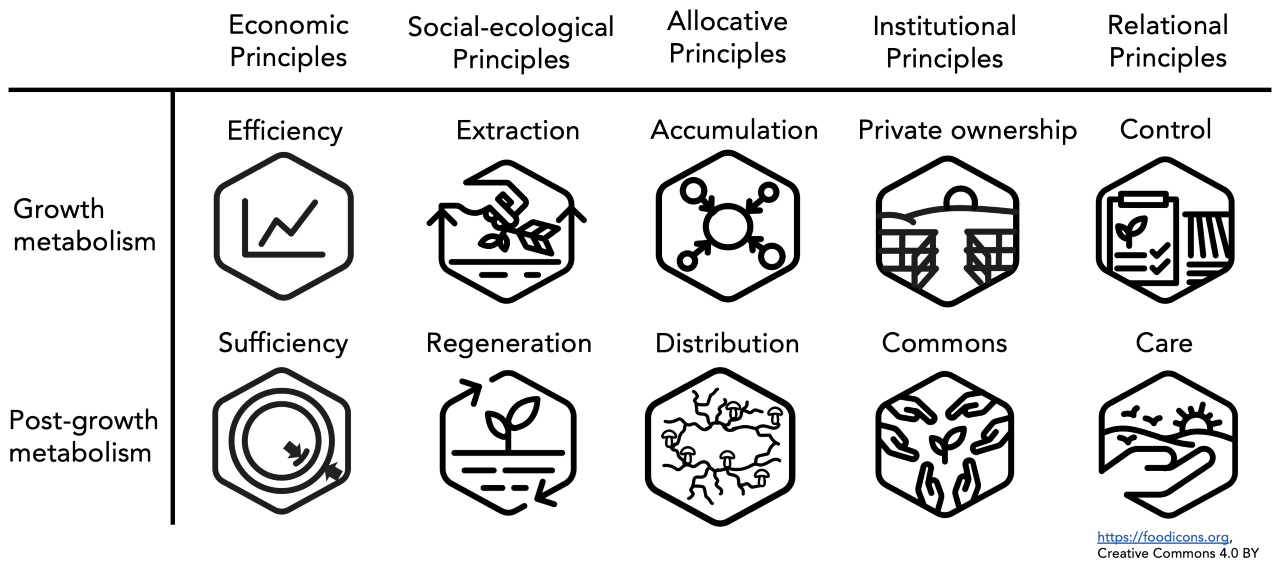Sustainable agrifood systems for a post-growth world
Scientists offer a blueprint for a sustainable redesign of food systems
Sustainable agrifood systems are critical to averting climate-driven social and ecological disasters. This perspective describes an agrifood system redesign according to the principles of sufficiency, regeneration, distribution, commons and care. This redesign should be supported by coordinated education and research efforts that point towards a post-growth world in which agroecological life processes support healthy communities, rather than serving as inputs for the relentless pursuit of economic growth.
The global food system is ‘Exhibit A’ in the crisis of market-led development. Exploitative of humans and animals, ecologically rapacious, hooked on fossil fuels, and controlled by a small number of multi-national corporations from farm to fork, this system produces massive quantities of the wrong foods at incredible social, ecological and economic cost. For decades, the global food system has led to severe rural poverty, unhealthy diets, massive ecological degradation, and a series of food crises. With food crisis again looming on the near horizon, the great misconception in food security discourse is that what is needed now–once again–is more of the same: more production by the same players in the same patterns, even though these patterns have been clearly shown to be socially and ecologically unsustainable at their core.
In a new perspective paper published in Nature Sustainability, a team of 32 food system scholars working across the fields of agroecology, geography, sustainability science, rural sociology, anthropology and economics, provide the blueprint for something very different: sustainable post-growth food systems.
The article describes food systems designed by principles of sufficiency over efficiency, regeneration over extraction, distribution over accumulation, commons over private ownership, and care over control. Reviewing the vast and diverse experience of small-scale farmers, food cooperatives, home gardeners, alternative retailers, and other endeavors to re-claim food systems in high and low-income nations, this agenda-setting article offers a model for post-growth food systems. Rather than serving the relentless pursuit of economic growth, it argues that the food system can instead be the foundation of healthy communities, ecologies and economies.
The authors call for policymakers, researchers and community groups worldwide to rethink their approach in developing new solutions beyond the current “growth paradigm.”
Reference URL: https://www.nature.com/articles/s41893-022-00933-5
Bibliographic Information
McGreevy, S.R., Rupprecht, C.D.D., Niles, D., Wiek, A., Carolan, M., Kallis, G., Kantamaturapoj, K., Mangnus, A., Jehlička, P., Taherzadeh, O., Sahakian, M., Chabay, I., Colby, A., Vivero-Pol, J.-L., Chaudhuri, R., Spiegelberg, M., Kobayashi, M., Balázs, B., Tsuchiya, K., Nicholls, C., Tanaka, K., Vervoort, J., Akitsu, M., Mallee, H., Ota, K., Shinkai, R., Khadse, A., Tamura, N., Abe, K., Altieri, M., Sato, Y.-I., Tachikawa, M. Sustainable agrifood systems for a post-growth world. Nature Sustainability, 1–7. https://doi.org/10.1038/s41893-022-00933-5 (August 4th, 2022)
Fundings
- FEAST Project (Lifeworlds of Sustainable Food Production and Consumption: Agrifood Systems in Transition) (no. 14200116) Research Institute for Humanity and Nature (RIHN)
- Japan Society for the Promotion of Science(JSPS) KAKENHI Grant Numbers 19K15931 and 20K15552, Social Sciences and Humanities Research Council of Canada (TRANSFORM, grant no. 50658-10029)
- María de Maeztu Unit of Excellence (no. CEX2019-000940-M) grant from the Spanish Ministry of Science and Innovation
- Czech Academy of Sciences Lumina quaeruntur award (no. LQ300282103)
- European Union’s Horizon 2020 research and innovation programme grant agreement no. 870759
- Dutch Research Council (NWO) Vidi project ANTICIPLAY (project no. VI. Vidi.195.007)
Media
-

Comparison of growth and post-growth metabolism principles
Transforming global agrifood systems for sustainability means moving beyond the growth paradigm. It requires reconceptualizing human food metabolisms according to values, food practices and lifestyles that strive for sufficiency over efficiency, regeneration over extraction, distribution over accumulation, commons over private ownership and care over control.
credit : Authors, using icons from https://foodicons.org (Creative Commons 4.0 BY)
Usage Restriction : Please get copyright permission
Contact Person
Name : Christoph Rupprecht
Phone : +81-89-927-9092
E-mail : rupprecht.christoph.bq@ehime-u.ac.jp
Affiliation : Faculty of Collaborative Regional Innovation
